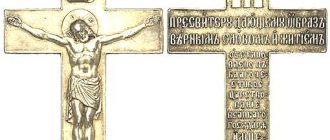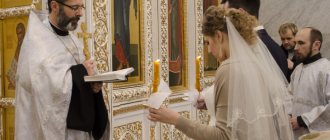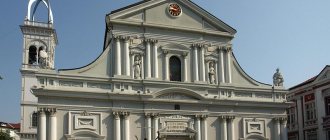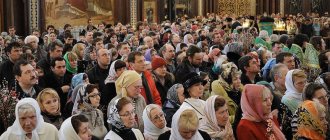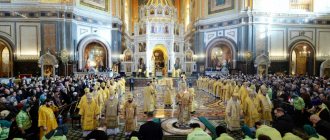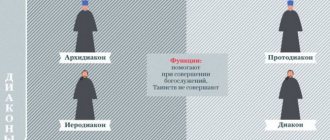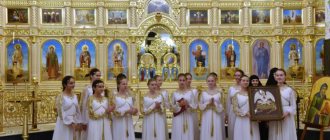Updated July 23, 2022 374 Author: Dmitry Petrov
Hello, dear readers of the KtoNaNovenkogo.ru blog. It would seem that there is nothing intriguing: we learned what a “canon” is from a young age, when we rubbed our elbows on the lid of a school desk and broke our teeth, crushing the stubborn monoliths of science into marble chips.
But did you know that this word – “kanon” – is rooted in such historical depths that even recognized linguistic mastodons find it difficult to name its age?
However, we can limit ourselves to stating that this term has a centuries-old and very interesting history.
Canon is...
Its origin is associated with the West Semitic “qānoeh/ḳānu”, which translated means “ reed ” or “reed”. The fact is that the Phoenician builders used a light reed pole as a measure of length, which did not deform or dry out, which means it ensured maximum (at that time) measurement accuracy.
We remind you that the West Semitic peoples who inhabited some regions of Palestine and Syria lived there 4 thousand years BC! Later, the term “κανών” came into use among the ancient Greeks, and also as a standard for measuring length.
Today, any dictionary invariably associates the word “canon” with the somewhat generalized concepts of “standard”, “ norm ”, “sample” - this is its direct meaning.
That is, a canon is a generally accepted rule, an established measure of compliance with given standards. At the same time, the concept of canons as a set of norms is used quite widely - in the spheres of art, science, religion, and public life.
Some of them were formed in the course of adaptation to the requirements of the era - such an etymology (history of origin) was acquired, in particular, by mathematically based instructions for constructing a human figure in the Renaissance.
Others were based on religious standards - the “Old Testament Canon” and the “New Testament Canon” (Old and New Testaments). There are also scientific canons, which are characterized by a clearly regulated structure - for example, methodological rules, requirements for scientific work.
Russian syllables
27.03.2018
Encyclopedic Dictionary of F.A. Brockhaus and I.A. Efron
CANON
(Greek κανών, literally ≈ straight pole ≈ any measure that determines the straight direction: spirit level, ruler, square).
In Ancient Greece, composers, grammarians, philosophers, and physicians used this word to describe a set of basic provisions or rules in their specialty that were axiomatic or dogmatic in nature (what later, in the era of scholasticism, was called summa, for example, summa philosophiae). For the ancient Greek jurists, κανών meant the same thing as for the Roman jurists, regula juris - a brief provision, a thesis extracted from the current law and representing a scheme for resolving one or another particular legal issue.
Vasmer's Etymological Dictionary
….
- Borrowing from Greek κανών “straight stick, cord, ruler”; see Bernecker 1, 481; Convert I, 292; Vasmer, IORYAS 12, 2, 238; Gr.-sl. this. 77 et seq. The construction of the form kanun to the Middle Greek. κανοῦν “basket” (Grotto, Phil. Raz. 2, 365; Golubinsky, Ist. Russian Church 1, 1, 535; Vasmer, ibid.) is unnecessary (see Bernecker, ibid.). Russian the form with -o- is literary in origin, while the form with -u- is folk.
Explanatory Dictionary by Efremova
CANON, m.
1)
a) An immutable rule, a position of something. directions, teachings, etc.
b) What is firmly established is taken as a model.
c) That which is a traditional generally accepted norm, custom, rule.
2) A rule, dogma, ritual, etc. established and legalized by the church.
3) Church hymn in honor of a saint, holiday, etc.
4) Exact repetition of one melody by different voices, sequentially entering one after another (a form of polyphonic music).
Big Russian Encyclopedic Dictionary
CANON
KAN'ON (from the Greek kan?n - norm, rule), a set of provisions that have a dogmatic. character:
- Biblical K. - a set of books of the Bible, recognized by the church as divinely inspired, used in worship as Holy Scripture. The Orthodox, Catholic, and Protestant churches differ somewhat in the composition of their products;
- church K. - rules in the field of dogma, cult, church organization, erected by Christ. church into law;
- (trans.) everything that is firmly established has become generally accepted.
School etymological dictionary of the Russian language
CANON. Borrowing from Art.-Sl. language, where canon < Greek. kanōn "canon, rule" < "ruler, stick for measuring length", suf. derived from kanna "reed, tube".
Why did I give so many academic definitions of the simple word “canon”? That's why. The authors of the cited dictionaries translate the Greek word differently. Sometimes it’s a straight pole, sometimes it’s a straight stick, a cord, a ruler, sometimes it’s a norm, a rule, sometimes it’s a basket, a reed, a pipe.
1) Greek κανών, literally ≈ straight pole ≈ any measure that determines the straight direction: spirit level, ruler, square.
2) Borrowing. from Greek κανών “straight stick, cord, ruler.”
3) From Greek. kan?n – norm, rule
4) Reconstruction of the form kanun to the Middle Greek. κανοῦν "basket"
5) Derived from kanna “reed, tube”.
Let's put a Russian mirror opposite the word canon and see what is reflected in it? Let us restore the original meaning of the word canon in the Russian semantic field.
canon
Literally:
1) Attached to (to) vertically (an) the entire (o) surface (n)
2) Attached to (to) vertically (an) entirely (o) lowered (n)
Canon -
1) Attached vertically entirely to the surface.
2) Attached and completely lowered vertically.
In the first case, it is a vertically installed pole, and in the second case, it is a vertically lowered cord, a plumb line.
This is what we see from etymologists. The meaning of the word canon, restored in the Russian semantic field, shows that the word may well refer to a pole, stick, or reed standing vertically above the water. The word may well be correlated with a square placed on a flat horizontal surface. It is unlikely that, without poetic meditation, the word canon can be correlated with a basket. Likewise, if you do not resort to free associations, the word canon (when broken down k-an-o-n) can hardly be compared with “immutable position.” All sorts of poles, squares, sticks and cords are quite unstable objects. However! However, the word canon can be broken down into its component semes differently. Let's look below.
Canon
Literally: non-shiftable (ka - but) position (n)
Here it is! Canon – non-shiftable position. A position that cannot be moved. Unshakable position (climb). Axiom. Principle. Rule.
We saw the reflection of the word canon in the Russian semantic mirror - an unshakable position. The phrase “unshakable position” has legal circulation in the Russian language to this day and, as we discovered, is a tracing paper from Russian to Russian and what I call prolaza. Butter oil. The canon is an unshakable position!
To decipher the meaning of words, the meanings of the letters of the alphabet given in the table . What do the syllables of the Russian language mean, see the page Meanings of syllables . Read about the method by which the meanings of letters and syllables were discovered in the first book . Dictionary of Recovered Literal Senses .
"Kara Censer, censer"
Church canons: from services to way of life
It is noteworthy that this definition becomes most multifaceted precisely in the religious sphere, where the canons form the basis not only of worship and hierarchy, but also of the life of Christian society as a whole.
The Orthodox "canon" can have several meanings :
- the norm of existence to which every person should strive;
- the genre of liturgical texts, including various forms of church poetry - traditionally the canons are read at funeral services, during preparation for communion, at church services held in the evening;
- a list of clergy of a particular diocese - the persons included in this list are called canons.
The breadth of the range of meanings of the canon is also associated with liturgical practice. In church hymnography, a canon is considered the main work that reflects a holiday or a specific saint.
Such a canon should not be confused with an akathist - the genres are similar in that they give praise to the Lord, the Mother of God, saints and holidays. The difference is that the akathist always begins with “Rejoice” and in it, in addition to the above, New Testament traditions are also glorified.
Another common meaning of the church canon is the concept of canonization , when especially righteous ascetics of the faith after death are canonized by the announcement of an act of the highest church authority.
There are several other types of church canons, but we will mention only the main ones:
- administrative – regulate administrative procedures and the scope of church governance;
- disciplinary - generally binding rules governing both the service of clergy and the behavior of believers in church and their extra-church life;
- dogmatic - contain a condemnation of any heresy and are designed to protect the laity from it.
Why are there so many canons in the church, what is the need for it? One might say, vital: no matter what society (or community) a person finds himself in, he in any case must comply with the norms and rules of behavior that are accepted in this society.
The need for canons in the church is understandable and expedient in the same way as the need for laws in any state.
Why is the QAnon movement so popular?
Each QAnon follower can contribute something different to the theory. It actually unites all conspiracy beliefs into a single belief. Satanists in the government, show business stars injecting themselves with “youth serum” obtained from innocent children, 5G towers spreading Rose K. What Is QAnon, the Viral Pro-Trump Conspiracy Theory? The New York Times coronavirus - QAnon easily absorbs the most selective conspiracy theories.
Is 5G technology really dangerous?


